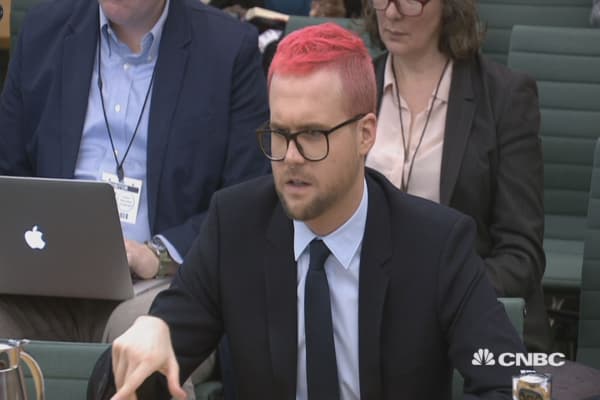Justina Crabtree
 Cambridge Analytica is in the midst of a dispute after an undercover sting operation caught senior executives boasting about psychological manipulation, entrapment techniques and fake news campaigns. Kenya's elections last year were marred by chaos and violence, which resulted in multiple deaths and injuries. The original vote, which took place in August, was overturned by the country's Supreme Court and re-run in October, with Kenyatta emerging victorious both times.
Cambridge Analytica is in the midst of a dispute after an undercover sting operation caught senior executives boasting about psychological manipulation, entrapment techniques and fake news campaigns. Kenya's elections last year were marred by chaos and violence, which resulted in multiple deaths and injuries. The original vote, which took place in August, was overturned by the country's Supreme Court and re-run in October, with Kenyatta emerging victorious both times.
Cambridge Analytica, the political analysis firm at the center of the Facebook data scandal, is a bad example of modern day colonialism, whistleblower Christopher Wylie said at a U.K. parliamentary hearing on Tuesday.
Citing the company's work in support of Kenyan President Uhuru Kenyatta's disputed re-elections, the former Cambridge Analytica employee said: "This is a company that goes around the world and undermines civic institutions of, you know, countries that are struggling to develop those institutions."
"They are an example of what modern day colonialism looks like. You have a wealthy company from a developed nation going into an economy or democracy that is still struggling to get, you know, its feet on the ground and taking advantage of that to profit from that," he added.
Cambridge Analytica is in the midst of a dispute after an undercover sting operation caught senior executives boasting about psychological manipulation, entrapment techniques and fake news campaigns. The company's CEO has been suspended and the U.K.'s Information Commissioner has raided its London office.
It is alleged to have used data gathered from Facebook users via a third party app to influence votes, including in the U.S. presidential election and the Brexit referendum, both in 2016. Cambridge Analytica has said that it was "committed to being responsible, fair and secure with data."
Whistleblower Christopher Wylie on March 26, 2018, in London, England.
Two of Cambridge Analytica's top executives, during undercover reporting by U.K. broadcaster Channel 4, spoke of operating in such developing countries as Mexico, Malaysia, Brazil and Kenya.
Wylie added that Cambridge Analytica had "worked extensively in India."
The firm's work on Kenyan President Uhuru Kenyatta's successful 2013 and 2017 election campaigns was described in the report.
"We have rebranded the entire party twice, written their manifesto, done two rounds of 50,000 (participant) surveys," Mark Turnbull, managing director of Cambridge Analytica Political Global, said in the undercover video.
"Then we'd write all the speeches and we'd stage the whole thing — so just about every element of his campaign," Turnbull added.
Kenya's elections last year were marred by chaos and violence, which resulted in multiple deaths and injuries. The original vote, which took place in August, was overturned by the country's Supreme Court and re-run in October, with Kenyatta emerging victorious both times.
Cambridge Analytica responded to Wylie's comments in a statement released Tuesday evening, which said that: "We are disgusted that Mr Wylie would use the tragic death of a member of our team as a means to further his own agenda. An investigation by Kenyan authorities concluded that there was nothing suspicious about our colleague's death, and we as a company were deeply saddened by the loss."
In a statement released last week after the Channel 4 report, now suspended CEO Alexander Nix said the company does not condone or engage in entrapment, bribes or so-called honeytraps.
Wylie's predecessor at Cambridge Analytica was found dead in a Kenyan hotel room while working for Kenyatta's election campaign in 2013, though the circumstances in which he died remain unclear.
"When you work in Kenyan politics, or politics in a lot of African countries, if a deal goes wrong you can pay for it," Wylie said on Tuesday.
"When you work for senior politicians in a lot of these countries you don't actually make money in the electoral work, you make money in the influence brokering after that," Wylie said. "A deal went sour."
"People suspected that he was poisoned in his hotel room, I also heard that the police got bribed to not enter the hotel room for 24 hours — but that is what I was told," he said, emphasizing that it was "pure speculation."
The Kenya presidential office and the police department were not immediately available for comment when contacted by CNBC.
Correction: This report had been modified to accurately reflect one of Wylie's quotes.

No comments:
Post a Comment